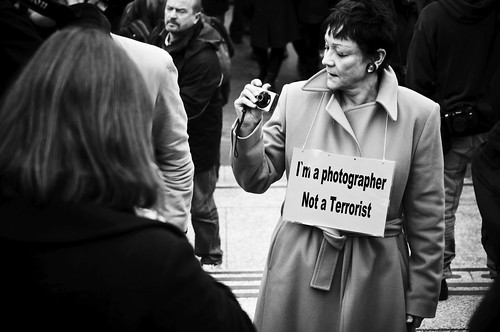 Starting last fall, stories started popping up in the British media and online about photographers who’d been stopped by officials empowered to question and search them if they seemed suspicious or might have some links to terrorism. Since then, more first person and news reports describe how tourists, journalists, and professional and amateur photographers alike have been questioned because they’d photographed subjects such as the Tower of London, the Royal Family, the interiors of railway stations, shopping malls, and buildings of architectural interest, or those that happened to be adjacent to office towers housing the offices of major banks or brokerage firms. As instances these “stop and search” incidents began to mount (see a video made of an Italian art student’s arrest here) , a group called “I’m a Photographer, Not a Terrorist” formed to track the story as it has developed, question government policy, and make photographers aware of their rights. Click here to see their website, which includes information, images, videos, events listings, and photo-ready and stylish line of merchandise.
Starting last fall, stories started popping up in the British media and online about photographers who’d been stopped by officials empowered to question and search them if they seemed suspicious or might have some links to terrorism. Since then, more first person and news reports describe how tourists, journalists, and professional and amateur photographers alike have been questioned because they’d photographed subjects such as the Tower of London, the Royal Family, the interiors of railway stations, shopping malls, and buildings of architectural interest, or those that happened to be adjacent to office towers housing the offices of major banks or brokerage firms. As instances these “stop and search” incidents began to mount (see a video made of an Italian art student’s arrest here) , a group called “I’m a Photographer, Not a Terrorist” formed to track the story as it has developed, question government policy, and make photographers aware of their rights. Click here to see their website, which includes information, images, videos, events listings, and photo-ready and stylish line of merchandise. 
 On January 23, an estimated 2,000 protesters gathered in Trafalgar Square in London, to demonstrate against legal restrictions on their right to make photographs in public places as defined in Section 44 of the UK’s Terrorism Act of 2000. Under that law, authorities have the power to stop and search photographers in both specified and unspecified areas in London and in other cities, and can view photographs in phones or cameras, but are not allowed to erase them. They can, however, seize equipment if they suspect its use may contribute to a terrorist act. As CNN reported, it was a lively event, including protesters who wore police costumes and badges identifying themselves as "vigilance officers," and people dressed as "freedom wardens" also made their way through the crowd pretending to arrest photographers.
On January 23, an estimated 2,000 protesters gathered in Trafalgar Square in London, to demonstrate against legal restrictions on their right to make photographs in public places as defined in Section 44 of the UK’s Terrorism Act of 2000. Under that law, authorities have the power to stop and search photographers in both specified and unspecified areas in London and in other cities, and can view photographs in phones or cameras, but are not allowed to erase them. They can, however, seize equipment if they suspect its use may contribute to a terrorist act. As CNN reported, it was a lively event, including protesters who wore police costumes and badges identifying themselves as "vigilance officers," and people dressed as "freedom wardens" also made their way through the crowd pretending to arrest photographers.
 All joking aside, while Europe’s Court of Human Rights quickly ruled against Britain’s “stop and search” practice as a breach of human rights, the British government has appealed the ruling, claiming that right stop-and-search is central to the fight against terrorism. This story is not going away anytime soon, as a recently posted piece on London’s Times Online site reminded me. Controversy continues to swirl about what kinds of picture-taking and images should or should not be legal to take, given the threat of terrorism, issues of child protection, and privacy concerns.
All joking aside, while Europe’s Court of Human Rights quickly ruled against Britain’s “stop and search” practice as a breach of human rights, the British government has appealed the ruling, claiming that right stop-and-search is central to the fight against terrorism. This story is not going away anytime soon, as a recently posted piece on London’s Times Online site reminded me. Controversy continues to swirl about what kinds of picture-taking and images should or should not be legal to take, given the threat of terrorism, issues of child protection, and privacy concerns.
Produced by the Smithsonian Institution Archives. For copyright questions, please see the Terms of Use.

Leave a Comment